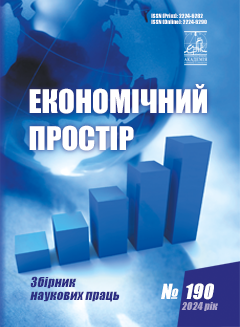ПОРІВНЯЛЬНИЙ АНАЛІЗ МОДЕЛЕЙ ТА МЕТОДІВ УПРАВЛІННЯ МАРКЕТИНГОВИМИ ПРОЕКТАМИ
Анотація
У статті розглянуто важливість та ефективність використання методології проектного менеджменту для гарантії вчасного та бюджетно-ефективного виконання проектів відповідно до вимог замовників. Автор наголошує, що управління проектами є стратегічним процесом, що охоплює ініціацію, планування, виконання, моніторинг, контроль та закриття проекту. Особливу увагу приділено ролі управління проектами в маркетингу, де складність та постійна динаміка вимагають ретельного планування та виконання. Використання методів управління проектами в маркетингових командах може поліпшити планування, підвищити ефективність та продуктивність, покращити комунікацію та співпрацю, забезпечити більший контроль над бюджетом та ресурсами, а також призвести до поліпшення результатів кампаній. Стаття надає вичерпний огляд різних методологій та їх відповідність конкретним умовам та типам маркетингових проектів.
Посилання
A Guide to the Project Management Body of Knowledge (PMBOK Guide), 2014 Ed. Network Square, PA: Project Management Institute.
Heagney J. Fundamentals of project management. Amacom, 2016.
Данченко О.Б., Лепский В.В. Сучасні моделі та методи управління проектами, портфелями проектів та програмами. Управління розвитком складних систем. Київ : вид-во Київський національний університет будівництва і архітектури, 2017. № 29. С. 46–54.
Єпіфанова І.Ю., Джеджула В.В. Місце процесу управління проектами в стратегії розвитку підприємств. Innovation and Sustainability. 2022. № 3. С. 8–13. URL: https://ins.vntu.edu.ua/index.php/ins/article/view/59
Шевченко Н.В., Давиденко М.В. Особливості реалізації маркетингових проектів у системі проектного менеджменту. Збірник наукових праць Черкаського державного технологічного університету. Серія: Економічні науки. 2017. Вип. 47. С. 41–47.
Стандарт з управління проєктами та Настанова до зводу знань з управління проєктами URL: https://pmiukraine.org/wp-content/uploads/2022/08/PMBOK7_Ukr_ForPersonalUseOnly.pdf
Якубенко І.М. Agile-менеджмент, як дієве управління проектами для цілеспрямованих команд. Економіка. Менеджмент. Бізнес. 2017. № 4(22). С. 167–172.
Данченко О.Б., Занора В.О.Проектний менеджмент: управління ризиками та змінами в процесах прийняття управлінських рішень : монографія. Черкаси : ПП Чабаненко Ю.А., 2019. 278 с.
Єгорченкова Н.Ю., Катаєва Є.Ю. Азбука управління проектами. Планування: навч. посіб. Київ : КНУ ім. Т. Шевченка, 2017. 117 с.
A Guide to the Project Management Body of Knowledge (PMBOK Guide), 2014 Ed. Network Square, PA: Project Management Institute.
Heagney J. Fundamentals of project management. Amacom, 2016.
Danchenko O. B., Lepsky V. V. (2017) Modern models and methods of managing projects, project portfolios and programs. Management of the development of complex systems. Kyiv: Kyiv National University of Construction and Architecture, no. 29, pp. 46–54.
Epifanova I. Yu., Jezhula V. V. (2022) The place of the project management process in the strategy of enterprise development. Innovation and Sustainability. no. 3, pp. 8–13. Available at: https://ins.vntu.edu.ua/index.php/ins/article/view/59
Shevchenko N. V., Davydenko M. V. (2017) Peculiarities of implementation of marketing projects in the project management system. Collection of scientific papers of the Cherkasy State University of Technology. Series: Economic sciences, issue 47, pp. 41–47.
Project Management Standard and Project Management Body of Knowledge Guide. Available at: https://pmiukraine.org/wp-content/uploads/2022/08/PMBOK7_Ukr_ForPersonalUseOnly.pdf
Yakubenko I. M. (2017) Agile management as effective project management for purposeful teams. Economy. Management. Business. no. 4(22), pp. 167–172.
Danchenko O. B., Zanora V. O. (2019) Project management: managing risks and changes in management decision-making processes: monograph. Cherkasy: PP Chabanenko Yu.A., 278 p.
Yegorchenkova N. Yu., Kataeva E. Yu. (2017) ABC of project management. Planning: training manual Kyiv: KNU named after T. Shevchenko, 117 p.



